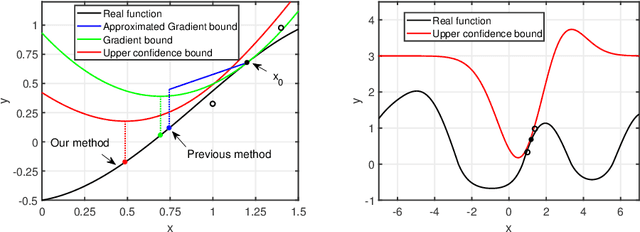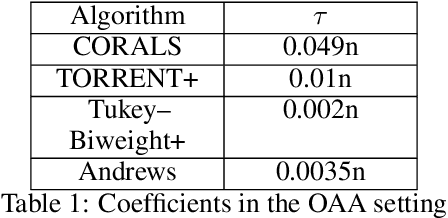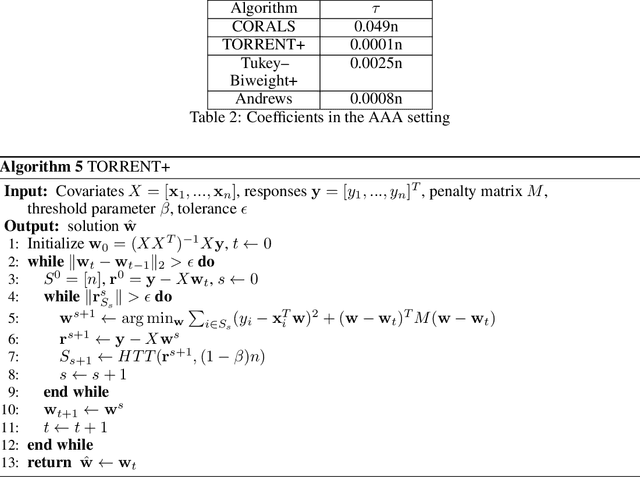Zheyi Fan
Minimizing UCB: a Better Local Search Strategy in Local Bayesian Optimization
May 24, 2024


Abstract:Local Bayesian optimization is a promising practical approach to solve the high dimensional black-box function optimization problem. Among them is the approximated gradient class of methods, which implements a strategy similar to gradient descent. These methods have achieved good experimental results and theoretical guarantees. However, given the distributional properties of the Gaussian processes applied on these methods, there may be potential to further exploit the information of the Gaussian processes to facilitate the BO search. In this work, we develop the relationship between the steps of the gradient descent method and one that minimizes the Upper Confidence Bound (UCB), and show that the latter can be a better strategy than direct gradient descent when a Gaussian process is applied as a surrogate. Through this insight, we propose a new local Bayesian optimization algorithm, MinUCB, which replaces the gradient descent step with minimizing UCB in GIBO. We further show that MinUCB maintains a similar convergence rate with GIBO. We then improve the acquisition function of MinUCB further through a look ahead strategy, and obtain a more efficient algorithm LA-MinUCB. We apply our algorithms on different synthetic and real-world functions, and the results show the effectiveness of our method. Our algorithms also illustrate improvements on local search strategies from an upper bound perspective in Bayesian optimization, and provides a new direction for future algorithm design.
Trajectory-Based Multi-Objective Hyperparameter Optimization for Model Retraining
May 24, 2024



Abstract:Training machine learning models inherently involves a resource-intensive and noisy iterative learning procedure that allows epoch-wise monitoring of the model performance. However, in multi-objective hyperparameter optimization scenarios, the insights gained from the iterative learning procedure typically remain underutilized. We notice that tracking the model performance across multiple epochs under a hyperparameter setting creates a trajectory in the objective space and that trade-offs along the trajectories are often overlooked despite their potential to offer valuable insights to decision-making for model retraining. Therefore, in this study, we propose to enhance the multi-objective hyperparameter optimization problem by having training epochs as an additional decision variable to incorporate trajectory information. Correspondingly, we present a novel trajectory-based multi-objective Bayesian optimization algorithm characterized by two features: 1) an acquisition function that captures the improvement made by the predictive trajectory of any hyperparameter setting and 2) a multi-objective early stopping mechanism that determines when to terminate the trajectory to maximize epoch efficiency. Numerical experiments on diverse synthetic simulations and hyperparameter tuning benchmarks indicate that our algorithm outperforms the state-of-the-art multi-objective optimizers in both locating better trade-offs and tuning efficiency.
CA-Jaccard: Camera-aware Jaccard Distance for Person Re-identification
Nov 17, 2023Abstract:Person re-identification (re-ID) is a challenging task that aims to learn discriminative features for person retrieval. In person re-ID, Jaccard distance is a widely used distance metric, especially in re-ranking and clustering scenarios. However, we discover that camera variation has a significant negative impact on the reliability of Jaccard distance. In particular, Jaccard distance calculates the distance based on the overlap of relevant neighbors. Due to camera variation, intra-camera samples dominate the relevant neighbors, which reduces the reliability of the neighbors by introducing intra-camera negative samples and excluding inter-camera positive samples. To overcome this problem, we propose a novel camera-aware Jaccard (CA-Jaccard) distance that leverages camera information to enhance the reliability of Jaccard distance. Specifically, we introduce camera-aware k-reciprocal nearest neighbors (CKRNNs) to find k-reciprocal nearest neighbors on the intra-camera and inter-camera ranking lists, which improves the reliability of relevant neighbors and guarantees the contribution of inter-camera samples in the overlap. Moreover, we propose a camera-aware local query expansion (CLQE) to exploit camera variation as a strong constraint to mine reliable samples in relevant neighbors and assign these samples higher weights in overlap to further improve the reliability. Our CA-Jaccard distance is simple yet effective and can serve as a general distance metric for person re-ID methods with high reliability and low computational cost. Extensive experiments demonstrate the effectiveness of our method.
A Novel Framework for Improving the Breakdown Point of Robust Regression Algorithms
May 20, 2023



Abstract:We present an effective framework for improving the breakdown point of robust regression algorithms. Robust regression has attracted widespread attention due to the ubiquity of outliers, which significantly affect the estimation results. However, many existing robust least-squares regression algorithms suffer from a low breakdown point, as they become stuck around local optima when facing severe attacks. By expanding on the previous work, we propose a novel framework that enhances the breakdown point of these algorithms by inserting a prior distribution in each iteration step, and adjusting the prior distribution according to historical information. We apply this framework to a specific algorithm and derive the consistent robust regression algorithm with iterative local search (CORALS). The relationship between CORALS and momentum gradient descent is described, and a detailed proof of the theoretical convergence of CORALS is presented. Finally, we demonstrate that the breakdown point of CORALS is indeed higher than that of the algorithm from which it is derived. We apply the proposed framework to other robust algorithms, and show that the improved algorithms achieve better results than the original algorithms, indicating the effectiveness of the proposed framework.
A Bayesian Robust Regression Method for Corrupted Data Reconstruction
Jan 08, 2023



Abstract:Because of the widespread existence of noise and data corruption, recovering the true regression parameters with a certain proportion of corrupted response variables is an essential task. Methods to overcome this problem often involve robust least-squares regression, but few methods perform well when confronted with severe adaptive adversarial attacks. In many applications, prior knowledge is often available from historical data or engineering experience, and by incorporating prior information into a robust regression method, we develop an effective robust regression method that can resist adaptive adversarial attacks. First, we propose the novel TRIP (hard Thresholding approach to Robust regression with sImple Prior) algorithm, which improves the breakdown point when facing adaptive adversarial attacks. Then, to improve the robustness and reduce the estimation error caused by the inclusion of priors, we use the idea of Bayesian reweighting to construct the more robust BRHT (robust Bayesian Reweighting regression via Hard Thresholding) algorithm. We prove the theoretical convergence of the proposed algorithms under mild conditions, and extensive experiments show that under different types of dataset attacks, our algorithms outperform other benchmark ones. Finally, we apply our methods to a data-recovery problem in a real-world application involving a space solar array, demonstrating their good applicability.
 Add to Chrome
Add to Chrome Add to Firefox
Add to Firefox Add to Edge
Add to Edge